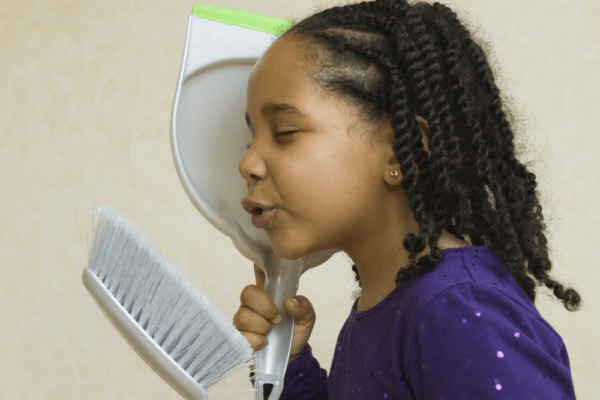Wired for Independence: How skills boost self-esteem
“Your preschooler will never learn to make decisions, learn new skills, or trust his own abilities if you don’t make room for him to practice. Parenting in the preschool years involves a great deal of letting go…True self-esteem does not come from being loved, praised or showered with goodies—it comes from having skills…Working together to learn skills can occasionally be messy, but it is also an enjoyable and valuable part of raising your child.”
~ Nelsen, Erwin, and Duffy 2007 Positive Discipline for Preschoolers
I have a few memories of the classroom, including the multi-ages (I always loved taking care of the younger children) and being absorbed into tasks that were of my own choosing. What I didn’t realize at the time, was of course the intention around every tool, and the strategic placement of items throughout the room. There was not too much, nor too little. Everyday items used for cleaning, eating, and sleeping were all miniature sized and accessible. Now as a school psychologist and parent, I see how interconnected early childhood development and the environment are.
Adaptive skills are the skills one needs to function independently in life. For our little ones, the skills that are developed in the first five years include things like eating, toileting, dressing, bathing, and even chores around the house. Having skills translates directly to self esteem: you see their eyes light up when they master putting a coat on by themselves, using the potty for the first time, or even sweeping.
This is a magical time developmentally when they are WIRED to WANT to do it independently.
They are explorers and scientists and it can feel biologically confusing when the grown ups get in the way of this, either by doing it for them completely, or punishing and pushing them faster than they are ready.
Over the years of assessing development, I have come up with a generalized way of approaching these kinds of skills.
By 2, PRACTICING
This means access! It can be as simple as getting a toddler sized potty and ditching the diapers. It might mean letting them try to put on their socks or shoes by themselves, as they roll around on the ground. Or making sure their food is able to be eaten independently, in small pieces and in a seat that is comfortable and at the right height to the table. Build confidence by giving them access to the sink to wash hands and help with dishes and cooking.
By 3, INSTRUCTIONAL
This is where we teach, set up routines, and give lots and lots of opportunity for practicing. Maybe we put on the pants just around the ankles, and then say “show me how you pull them up!” Or explain where the forks go when setting the table, and how to clear their place step by step. During meals, give them a small pitcher of water to practice pouring, so they can refill when they are thirsty (not having to rely on you to be their waiter).
We said goodbye to our margarita pitcher from pre-kid days (the big glass jar kind with the spout at the bottom) and filled it with water so our kids can access it when needed.
By 4, INDEPENDENT
At this age, the routine might be that they choose their clothes the night before (with your help to determine whether and appropriate choices), and they are laid out so that in the morning they can put them on without help. Will they come out with a shirt backwards? Probably, and that is ok! The key is to let them take the lead. Toileting at this age might still need help with wiping and cleaning up accidents, but helping with their own sheets is empowering! Recently, I broke down step-by-step how to get conditioner into ALL of my 4 year old’s hair, to brush it through in the bath, and to rinse it all out by herself. She is so proud of her easy to brush hair now.
While the ages OF COURSE are not set in stone, this is generally a good guideline to set up expectations and routines so that they are able to rise to higher levels of capability.
For all ages, do an assessment of your home to make items accessible AND easy to put away:
Where are their plates, bowls, and cups? Do they have stools to reach the sink and easy soap to pump? Can they get a washcloth themselves to wash their face after clearing their place? Do you have a spray bottle filled with water and vinegar next to some rags so they can wipe up a spill? Are clothes easy to access independently?
To make cleaning up feasible and part of the daily routine, make sure toys are organized into accessible bins AT THEIR LEVEL so they know exactly where to put away their duplos, dolls, trains, puzzles and art supplies. Here is the other Montessori trick:
Make sure there is not too much and rotate them through!
My mom is a librarian, and my sister owned a bookstore for many years so the book situation got ridiculous in our house. I felt like I was letting them down if I didn’t have every single book out at all times. When I shifted my thinking, realizing my children were overwhelmed by the choices and volume, emotional and physical space appeared. We now rotate books in shifts by season, and they are much more absorbed by the content.
Does this all take time to rearrange the environment? Yes, it does. I remember an indignant mom asking me in a parenting class, “so you are saying I need to rearrange my cabinets?” YEP. These adaptive skills don’t magically appear with a wand, people!
If you are overwhelmed as a grown-up, think about how overwhelmed your little one is! Take it one step at a time (or one room at a time), and use and reuse what you already have (shoeboxes and cleaned food jars instead of expensive bins), or fold them into future birthday presents (stools, little dustpans, and child-size brooms make great gifts).
So, what’s the take-away?
Our kids are capable, and skills boost self-esteem.
By allowing time for training and practice, you are giving your children opportunities to flex their independence muscles and -BONUS- avoid some power struggles along the way too!
Check out our Chores list here. Want to know more about building a culture of teamwork through chores? Check out the blog here.





Comments